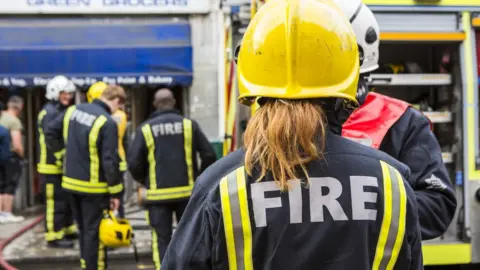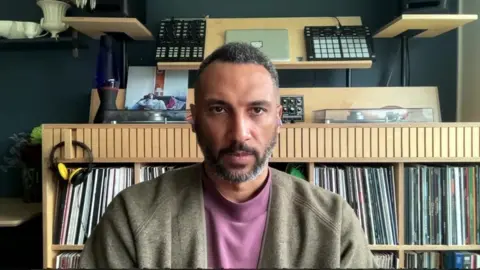Fire services: Shocking bullying and abuse widespread, report says
 Getty Images
Getty ImagesEvidence of bullying, harassment and discrimination in every fire and rescue service in England, could be "just the tip of the iceberg", say inspectors.
In about a quarter of the 44 services, their report found staff complaints of homophobic, sexist and racist behaviour - often excused as banter.
Cases include male firefighters telling a colleague they would rape her and a senior officer using a racial slur.
The government called the findings "deeply concerning".
His Majesty's Inspectorate of Constabulary and Fire & Rescue Services (HMICFRS) independently assesses and reports on the effectiveness and efficiency of police forces and fire and rescue services.
The watchdog's Roy Wilsher said he was "shocked and appalled" by the findings and urged the sector to "get a grip" on how it handles misconduct matters.

"The problems came from the top"
Former firefighter Gareth Dawes, who left London Fire Brigade in September 2022, after highlighting its "toxic" culture, urged fire chiefs to look at their own role in the misconduct identified in the report.
He said his own efforts to counter racism had shown just how poor the handling of complaints is within the fire service.
The issues raised by the watchdog came as no surprise, he added.
"It's definitely not a shock to the people it's actually happening to," Mr Dawes told BBC News.

"In my experience, the problems came from the top: it came from a lack of awareness; it came from a lack of ability to self-reflect and to see how they play their part," he said.
"It came from pointing downwards and looking for 'bad apples', instead of looking at the part they play within the system that allows this behaviour, and sometimes promotes this behaviour."
"Unless the top changes, the complaints that come from the bottom will never be recognised for what they are."
Sexually assaulted
A female firefighter, who spoke anonymously to BBC Radio 4's World at One, said she had been harassed, bullied and sexually assaulted by a crew manager at her station - but when she complained, she lost her job.
"I made a complaint to my commander... and within two weeks, I was gone from the brigade. They got rid of me. They said I'd become unsuitable for the role."
She added: "What I know now is if you complain, as a female... they'll end up investigating you instead of the man who did it. They'll end up just getting rid of you."

Last year, the inspectorate placed fire services in London and Gloucestershire in special measures, amid complaints of racism, misogyny and bullying.
In the recent report, the inspectorate looked at the values and culture of all 44 fire and rescue services in England, and drew on evidence collected during inspections since 2018.
Its report said there were allegations of racist, homophobic and misogynistic behaviour in 11 of these - but said it would not name them because allegations were made in confidence and some incidents were ongoing.
Those who spoke to inspectors likened the fire service to a "boys' club" and said they felt unable to report bad behaviour for fear of reprisal.
One feared their "card would be marked" if they complained about offensive behaviour; another described it as "career suicide".
In one reported incident, male firefighters used the women's on-site toilets, but female colleagues did not feel confident challenging the behaviour.
Inspectors were also told of staff being humiliated for making mistakes during training sessions and being shouted down by senior staff.
One senior officer allegedly threatened to "make life hell" for a firefighter who complained about a racist comment.
The report also highlighted there was no obligation for staff to undergo background checks and called for changes to the recruitment procedure. It makes 35 recommendations, including:
- appropriate background checks on all firefighters and staff
- the introduction of new misconduct standards including a national list of barred personnel
- better systems to help staff raise concerns
The report found the fire service to be the least ethnically diverse workforce in the public sector.
Roy Wilsher, from the inspectorate, said the majority of fire and rescue staff behaved with integrity.
He said he had assumed the actions described in the report belonged to "the dim and distant past" and told firefighters it was "time for this behaviour to stop".
Matt Wrack, general secretary of the Fire Brigades Union (FBU), welcomed the report's acknowledgement of "the scale of the problem" and promised the union would "take a leading role" in transforming its culture.
"It is clear, both from our experience and from the contents of this report, that the failure to address discrimination and harassment in the service goes right to the top," said Mr Wrack.
Dame Diana Johnson, chair of the Commons Home Affairs Committee, said: "People who just want to protect their communities have to deal with bullying, harassment and sexual assault.
"They have to put up with it or leave when they see the perpetrators go unpunished, their careers progress[ing] without a hitch. This is simply not acceptable."
Mark Hardingham, Chair of the National Fire Chiefs' Council said the report made difficult reading and promised a national action plan to deliver change, within a month.
Mr Hardingham told World at One: "Yes, I would encourage my daughter to go and join a fire and rescue service and be part of the cultural change that's needed in our service."
The government department responsible for fire and rescue services described the findings as "deeply concerning" and promised to address the issues, alongside the Inspectorate and fire chiefs.
"We want to see fire and rescue services where everyone is welcome, treated with respect and able to thrive," said a Home Office official.


Have you been personally affected by the issues raised in this story? Tell us by emailing: [email protected]
Please include a contact number if you are willing to speak to a BBC journalist. You can also get in touch in the following ways:
- WhatsApp: +44 7756 165803
- Tweet: @BBC_HaveYourSay
- Or fill out the form below
- Please read our terms & conditions and privacy policy
If you are reading this page and can't see the form you will need to visit the mobile version of the BBC website to submit your question or comment or you can email us at [email protected]. Please include your name, age and location with any submission.
